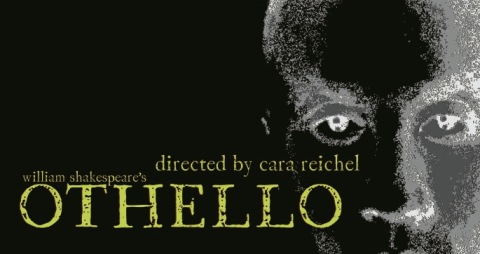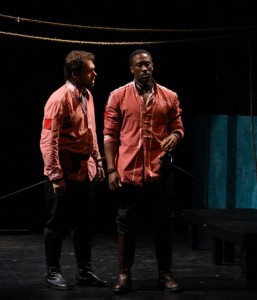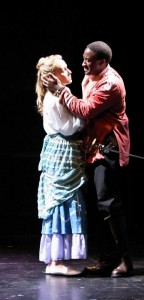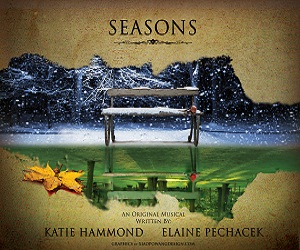
In the third part of our interview series on Oberon Theatre Ensemble’s Summer Rep 2010, I was delighted to be able to speak with Cara Reichel, Director of Othello, and Producing Artistic Director for Prospect Theatre Company. Coincidently I finally got to see Othello last night (Othello is one of my favorite plays of The Bard). Cara’s ability to weave music (brilliant violin and djembe) in as a way to accentuate both the beauty and horror of the piece was brilliant. That shouldn’t be surprising, considering that Cara has much experience with and an affinity for music and theatre – as we can see from the following interview:
Cara, the first time I saw your work was when I was fortunate enough to see The Rockae, and I was blown away. I never knew that I could see a Greek play such as that with the kind of spin that it took – and have it WORK. Many directors/producers try to do things differently “just for the sake of doing it” and that is where they fail and you succeed. What has pushed you in the direction of putting up shows in the unique way that you do?
I’ve had the luxury of working with Prospect Theater Company, of which I am a founding member and the Artistic Director, for the past 11 years, so if I have an idea I’m passionate about, I’ve usually been able to pursue it and try it out. That’s an opportunity I’m really grateful for and I suppose has made me confident about pursuing sometimes outrageous ideas. I really love doing adaptations of classic works (such as with THE ROCKAE, which was a heavy metal adaptation of THE BACCHAE), as well as new material. However, my production of OTHELLO for Oberon Theatre Ensemble isn’t really an adaptation — although I did have the idea of including the violin and djembe, which I suppose is a new approach.
What are your favorite kinds of works; or, better yet – what is it about a play that draws you to it to the point that you feel you MUST be involved?
I think those are definitely two separate questions. Often times, my favorite kind of work to watch is one that I am amazed and delighted by because it’s so outside the realm of my own ability, or it’s something I wouldn’t have thought of. I typically say that I prefer plays that grapple with big existential questions and aren’t afraid to embrace the epic … but I love really, really funny or intimate things too. For me, it’s an intuitive thing. If I read or see a play — or have an idea for a production, since many of the pieces I work on are generated from concepts — and something about it sticks with my subconscious, then I create a little place for it on the list of projects I’d like to tackle someday.
Do you prefer plays or musicals?
Well, I mostly work on musicals. And, I put a good bit of music into OTHELLO. So, I suppose I have to say I “prefer” musicals. But that’s really a silly question — I prefer to work on and see challenging, engaging, and smart theater. There are just as many musicals I’d avoid as plays I’d avoid. To me, music is another tool in the box that you can use to tell a good story — along with acting, design, choreography, etc. If it useful and helpful to telling the story, then why not add a little music?
How well did you know the members of Oberon Theatre Ensemble before coming on board? You have worked with some of them before, have you not?
I worked as the associate director on a production of THE MERRY WIVES OF WINDSOR in, I think, 2007. I enjoyed working with the company quite a bit, and was glad when the stars aligned and this second opportunity came my way. Stewart Walker, who plays Iago, was in that production as Dr. Caius, so we’d worked together before – and of course I knew Brad Fryman, Oberon’s Artistic Director. Randy Howk, who plays Roderigo in OTHELLO I saw onstage in an Oberon production last summer, and then subsequently worked with him on a project for Prospect. Actually the actor I know best in this production is Jen Blood, who plays Desdemona … we’ve worked together for 10 years now on a variety of projects. I think the OTHELLO cast is a great mix of Oberon stalwarts, actors I’ve worked with in other contexts, and many brand new folks who we met through the audition process! They have come together to create an excellent ensemble.

Iago (Stewart Walker) Othello (Daniel Morgan Shelley)
The most interesting thing to me was the exploration of the conflict between our rational and irrational selves. Over and over in the text, Shakespeare talks about the “beast” or “monster” within — early on in the play Iago has a great speech exploring this idea which really seemed to me to be the thematic core of the text for me — “If the balance of our lives had not one scale of reason to poise another of sensuality, the blood and baseness of our natures would conduct us to most preposterous conclusions: but we have reason to cool our raging motions, our carnal stings, our unbitted lusts.” This is a pretty different worldview than my own — so looking at human nature from the flip side drew me in.
What did you find to be the most challenging aspect of working on a play such as Othello, and, conversely, what allowed you to play and have fun with the piece?
The most challenging part of this production was working on a very tight timeline. It’s quite a massive play to do on a showcase schedule and budget. The most challenging part of working on the play was trying to navigate Othello’s arc and mindset. It’s hard for me to understand why a character who seems so together up until the end of Act III suddenly goes so off the deep end. It’s almost the opposite of HAMLET – Hamlet’s uncertainty I can understand! If I were workshopping this play with Shakespeare, as a new piece, my comment to him would be — don’t you think we should wait to have him swear vengeance and make up his mind about things until a bit later in the play? It’s very sudden. But, that challenged me to think a lot about the character of OTHELLO and what sort of person I could believe WOULD have such a reaction. What allowed me to play and have fun while working on this piece was our wonderful cast. Facing the challenges of this text without a truly collaborative group would have been overwhelming, but working together with the actors each rehearsal was an exciting process of discovery.
What do you think is the most important link between the two plays in Oberon’s Rep, Othello and Order, and how do they relate to the state of the human condition?
I think both these plays confront questions of the “demons within” each of us. Seeing these two plays in rep provides two very different interpretations of those darker aspects of our human nature.
How do you feel set, costume, and lighting design speak to your work (Othello and your other works from the past) and when you work with the designers, what is that collaborative process like?

Daniel Morgan Shelley as Othello and Jennifer Blood as Desdemona
Usually the designers are some of the first partners in a collaborative process. The discussions I had with the OTHELLO team, in trying to figure out a simple and powerful idea for how to stage the play, were very helpful for me. Ann Bartek and I somehow came up with this idea of “ropes” for the set, which could be re-arranged for the various locations — I really loved this idea and how the actors could interact with and change the set at various key moments in the play. Figuring out how to incorporate the ropes really informed how I staged some crucial scenes. The lighting design is also truly essential for OTHELLO in helping control the mood and world of the play, and the color coding of the costumes is so helpful for a show in which I have actors playing multiple roles, so the audience can more easily follow the story. to me, the design best process is one where the elements of the design arise so organically from a deep discussion of the play that, looking back, you can’t identify where the core ideas came from — but everyone feels they are right for the production, and they work! It’s rare that all these elements come together … but that’s a sign to me of a good and true collaboration that serves the play rather than imposing an idea on it.
What is your favorite Shakespearean play? Your favorite Greek play? Which would you rather do next, if the opportunity arose?
I don’t really think I have favorites… but in general, I’m more drawn to Shakespeare’s work than the Greeks. One of my favorite challenges is finding ways to make plays work in a new context… so I suppose the one I’d prefer to do is the one I have a good idea for! I directed JULIUS CAESAR a number of years ago and I hope to return to that project again in the future.
Who are your greatest inspirations in the industry – regardless of medium?
Directorially, I am a big fan of Mark Wing-Davey. I just saw PASSION PLAY and was truly inspired by that beautiful show so that’s been on my mind a lot. I also really admire Adam Guettel’s work. And of course there are many women directors whose careers inspire me daily in different ways: Tina Landau, Graciela Daniele, Susan Stroman, Susan Schulman…
If you had to pick a character from a play, book, or film to be for a day, who would it be?
I’m spending way too much time trying to decide my answer to this one, and I think it might be impossible to say definitively… so I will say GANDALF. Or Maria, from the Sound of Music (before the Nazis arrive).
What’s next on your agenda? Do you have a play or project brewing that we’ll be lucky enough to see?
My next major directing project is Prospect Theater Company’s fall show, ONCE UPON A TIME IN NEW JERSEY. It’s going to be great fun — it’s a musical comedy set in 1950′s Hoboken — about as far as you can get from OTHELLO. I’m excited about it, but it also makes me realize what a great experience it was for me to work with Oberon and stretch some different muscles while working on this play!
* * *
Well, we’re also delighted that she had the opportunity to work with Oberon. We’re also thrilled to have had the opportunity to speak with her about the production and get some insight into the mind of one of theatre’s most prolific producers/directors today! I look forward to seeing many more of Cara’s productions in the future. As for Othello, it ends its run on June 24th – so get thee to the theatre!



{ 0 comments… add one now }